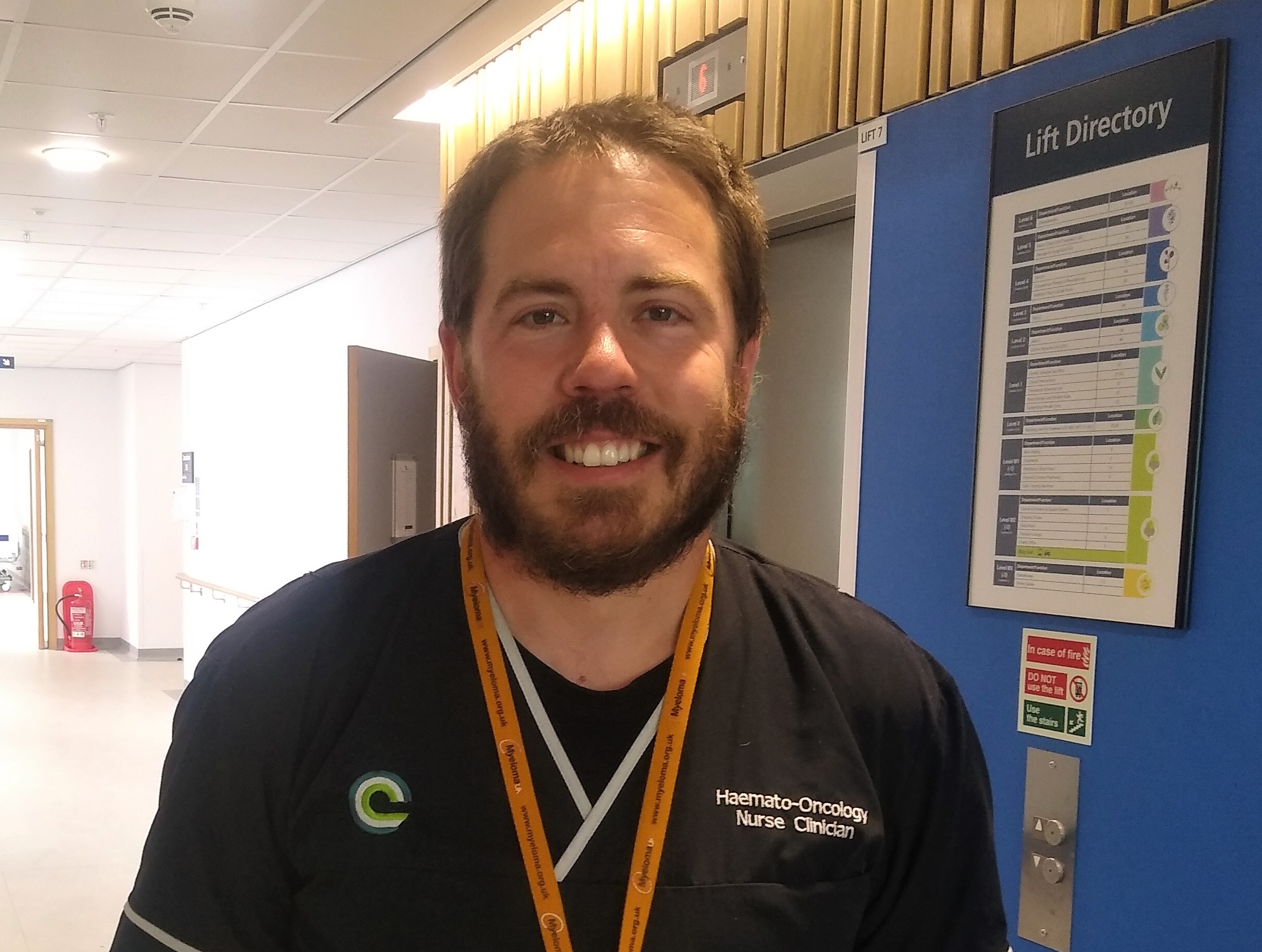Meet the blood cancer team: Haemato-Oncology Nurse Consultant Craig Simon
Posted 8th September 2022

Our Haemato-Oncology (blood cancer) team provide expert care for people with leukaemias, lymphomas, myelomas and patients having stem cell transplants. They provide all the blood cancer care at Clatterbridge Cancer Centre – Liverpool and Aintree University Hospital.
Nurse Consultant Craig Simon runs clinics for myelomas and plasma cell disorders and manages the specialist nurses within the wider Haemato-Oncology team. Read more about myeloma, treatment options and Craig’s role as a Nurse Consultant.
I hadn’t planned to be a cancer nurse but I did a haematology placement in the second year of my nursing degree and liked the fact you get to care for people over a period of time and can really build a rapport with them. I was then lucky enough to get a job there straight after I qualified. I’ve continued training and gaining more advanced qualifications throughout my career, progressing from staff nurse to deputy ward manager and then into specialist roles.
My role as Nurse Consultant has two parts. The first is my clinical specialty in myeloma and plasma cell disorders. The second part is managing the clinical nurse specialists (CNSs) and advanced nurse practitioners (ANP) in Haemato-Oncology.
Myeloma is a cancer that develops in a certain type of white blood cell (plasma cells) in the bone marrow. There is no absolute cure – it’s what is known as ‘relapsing and remitting’ – but there are lots of treatments that help control it and mean patients can often have a good quality of life for a long time.
People with myeloma may not have any symptoms in the early stages – they often find out by chance through blood tests or after experiencing bone pain, fractures, repeated infections or a condition called spinal cord compression.
When people are first diagnosed, they often have very high levels of abnormal protein (immunoglobulin). Treatments are targeted at reducing immunoglobulin and they can be very effective, sending the cancer into remission for months or years at a time. Eventually the cancer will return so we start another treatment to reduce the spike in abnormal immunoglobulin. The remissions between these spikes tend to get shorter over time.
As a Nurse Consultant with many years of experience and additional training, I am qualified to run my own myeloma and plasma cell disorder clinics and prescribe medication. I can also see patients who are on clinical trials and prescribe those trial drugs for them. It’s very interesting and rewarding work – I really enjoy clinical practice and being able to care for and support my patients.
The Haemato-Oncology service at Clatterbridge has sub-specialist teams in key fields: leukaemias, lymphomas, myelomas, myeloproliferative neoplasms and stem cell transplant. Each sub-specialty team includes doctors, nurses and other professionals who have particular expertise in that field.
As well as working within the Myeloma team, my role as Nurse Consultant involves providing professional leadership to the non-trials clinical nurse specialists (CNSs) and the advanced nurse practitioners (ANPs) in all sub-specialty teams.
Since February 2022, The Clatterbridge Cancer Centre has also managed the blood cancer service at Aintree University Hospital. The nursing staff there are now part of the same team as those in Clatterbridge Cancer Centre – Liverpool. It’s been really interesting integrating the two teams, learning from each other and developing a new service across both sites.
I’m also working with colleagues in the Clinical Decisions Unit (CDU) and our Hotline team to enhance urgent cancer care for people with blood cancers. Blood cancers are a bit different from other cancers and, historically, people who suddenly become very unwell (e.g. with treatment side-effects) have ended up in A&E and acute hospitals rather than a cancer centre. We’re working on ways to make CDU more accessible to people with blood cancers, reducing the need for them to go to A&E.
We have lots of plans to enhance and develop the Haemato-Oncology service even more over the next few years, as new treatments emerge. It’s very exciting and we are really committed to making sure our patients receive the very best care possible.
